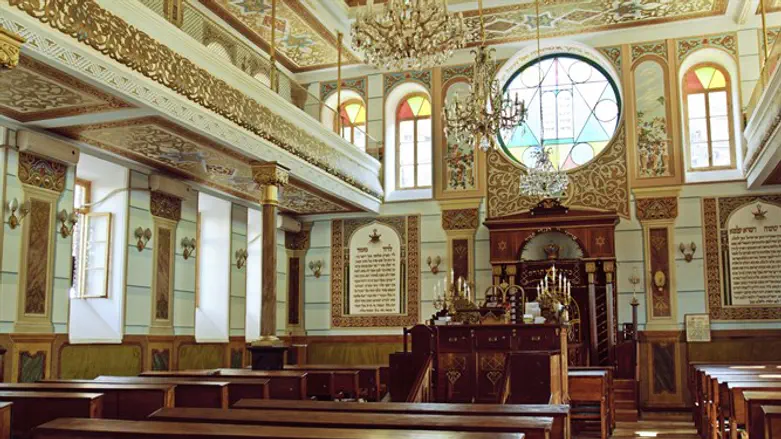
JTA – The Conservative movement may be poised to open its doors to non-Jewish members, with a formal vote on the issue expected in March.
Confronted by the growing level of intermarriage in the American Jewish community at large and in many Conservative congregations across the country, along with dwindling memberships, Conservative movement members will be voting on a measure from their umbrella body that would allow congregations to admit non-Jews as members.
The Conservative Movement originally arose as a reaction to excesses of the Reform Movement, which did not mandate the keeping of commandments, even serving non-kosher food at the ordination of its first clergymen. The new movement, while not insisting on basic beliefs of halakhic Judaism, such as the Revelation at Sinai, saw keeping commandments as a historic connection to Judaism, modifying them to be in line with what was in fashion in the modern non-Jewish world, as in this case.This is in sharp contrast to halakhic Sages throughout Jewish history, who decide on answers to questions in Jewish law and deal with societal change from within the halakhic system, without changing the system.
Currently, the United Synagogue of Conservative Judaism’s Standards for Congregational Practice restrict synagogue membership to Jews. But the new language, which congregations will vote on in March, would allow individual congregations to decide whether to grant membership to non-Jews.
“USCJ supports every affiliated kehillah in developing its own criteria for membership,” the proposed language reads, using a Hebrew word for “congregation.”
The proposed resolution grew out of a commission set up last March to explore ways to handle rising intermarriage rates.
The official description of the new by-law says, “We celebrate the diversity among and within our kehillot and encourage the engagement of all those who seek a spiritual and communal home in an authentic and dynamic Jewish setting. We call on all of our kehillot to open their doors wide to all who want to enter.”
Rabbi Steven Wernick, United Synagogue’s CEO, told JTA on Friday that the current standards were antiquated and estranged non-Jewish family members.
“The language of ‘only Jews can be members of a synagogue’ makes it seem like a non-Jew who is connected is not a member of that community,” Wernick said. “What we’re trying to do with this is distinguish between community and covenant.”
While Jewish tradition calls for the complete inclusion of converts into communal life, it does not sanction marriage between Jews and non-Jews, nor the participation of intermarried non-Jewish relatives in synagogue services. Differentiating between 'community' and 'covenant' is a semantic way to get around that prohibition. It remains to be seen if non-Jews are allowed to be called up to say the blessings over the Torah, which is absolutely against halakha.
The Conservative movement prohibits its rabbis from marrying or attending the nuptials of interfaith couples, though some of its synagogues have endorsed intermarriages. In recent years, several Conservative rabbis have protested the intermarriage prohibition.
“I understand and I’m very sensitive and respectful to the anxiety about the domino effect,” Wernick said. “We’re living in a moment when paradigms are shifting, so the anxiety is very real, and the questions that come out of these paradigm shifts are also very real. Our job is to frame the questions and help our network navigate through this moment in history.”
Wernick said that many non-Jews are already de facto members of Conservative synagogues because their families have paid dues for family memberships. He dismissed the idea that this change would open the door to non-Jewish presidents of congregations, as it wouldn’t make sense for a non-Jew to want to lead a synagogue. But there are no plans, as of now, to pass a by-law formally restricting synagogue leadership positions to Jews. Time will tell if that, too, will come to pass.
“It’s a false premise that non-Jews are lining up to take significant roles within our synagogue and that the leaders of synagogues are eager to have non-Jews take on leadership roles,” he said.
The change has been endorsed by the major Conservative institutions in the United States, including their Rabbinical Assembly, the Jewish Theological Seminary and the Ziegler School of Rabbinic Studies.
“Our communities can and must grow stronger, and diversity within and among them will help to make them so,” wrote JTS Chancellor Arnie Eisen in a December endorsement letter. “Our fulfillment of the age-old covenant binding Jews to one another, to the world and to God, must be faithful to what sets us apart — and bold in bringing our tradition to bear in altered circumstances.”